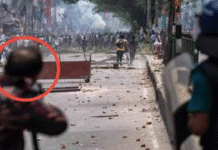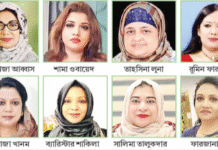Hundreds of unaccompanied Rohingya children separated from both parents and relatives in the ongoing violence in Rakhine state of Myanmar are roaming in Cox’s Bazar in search of their near and dear ones while UNICEF finds over 2,00,000 Rohingya children at risk.
Stressed, tired and incredibly vulnerable children who entered Bangladesh fleeing violence and persecution, including killing, torture and arson, in their homeland, crossed hills, muddy paths or rough sea route dodging Border Guard Bangladesh were now moving toward bleak future.
About 52,500 Rohingya children, aged between 4 and 14 years, fled to Bangladesh after August 25, when the recent violence erupted in Rakhine state, estimated UNICEF.
Many of these children are traumatised and memories of seeing killing, slaughtering and arson attack on their near and dear one and their experience on path while fleeing are causing huge mental pressure and their mental growth would certainly be hampered, said UNICEF specialists and clinical psychologists.
As these children are deprived of major source of a child’s emotional and physical security, these separations can have a devastating social and psychological impact, they said.
‘These children have fled a situation like civil war in their country. They have been separated from their families during their travel to Bangladesh to seek refuge,’ said the UNICEF Bangladesh child support unit director Jean Lieby.
‘We have identified 1,128 children who are separated. However, we expect this number to increase a lot in the coming days,’ Jean Lieby said in a statement on Tuesday.
‘We have no indication that this influx will stop soon. This is a growing humanitarian crisis and children are at the heart of this crisis. 60 per cent of all refugees are children, according to preliminary data. We believe that 200,000 Rohingya children need our urgent support,’ the statement said.
‘These children are at the forefront of this humanitarian crisis. They are at incredible risk,’ Jean Lieby.
‘They need specialised care as they witnessed terrific and terrible things in their life during battle like situation, this is something we are looking into,’ he told New Age.
An Inter Sector Coordination Group report said on Monday that 925 (430 boys and 495 girls) unaccompanied asylum-seeking Rohingya children’ had been identified in registered refugee camps after since August 25.
Sources in the International Organisation for Migration engaged in managing the portal of Inter Sector Coordination Group said that actual number of unaccompanied children would be much more as about 50,000 Rohingyas took shelter at two registered camps while about 3,70,000 Rohingyas entered Bangladesh in the past two weeks.
Rohingyas are a stateless ethnic minority in Myanmar not allowed to exercise their basic rights including freedom of movement, right to education and work and other social, civic and political rights.
UNICEF executive director Anthony Lake in a statement on September 7 said 80 per cent Rohingays fleeing to Bangladesh were women and children.
Thirteen-year old Rohingya child Syed Ullah, son of Karim Ullah, was found roaming at Sabarang of Teknaf in search of his parents, two siblings.
He said that he fled from Rathidong of Myanmar. ‘I want to see all…I do not know what happened to them, where they are,’ he said in tears.
Twelve-year old Abdus Sobhan, son of Abul Kashem from the same area, was found Shamlapur area requesting local people for some food and ways to can find out his parents and three siblings.
Both the boys said that they fled their homeland to save life as some people started firing and setting fire to their houses. They entered Bangladesh walking into hilly areas and crossing the Naf River with the help of fellows.
‘We walked all day and night and searched my family all the way in vain,’ Sobhan lamented.
People working with international humanitarian agencies said that children and adolescents who lost all that was familiar – home, family, friends, stability – were one of the ominous pointer of impact of humanitarian crises on individual lives.
These children are at risk of exploitation and abuse, they said.
Dhaka University clinical psychology professor Mahmudur Rahman said that mental development of children living without parents, family and seeing such violence would not be proper.
‘These children are now going through acute stress disorder and in the long run can develop post-traumatic stress disorder,’ he said.
‘They would not be able to adjust their lives, they might have trouble sleeping due to anxiety,’ he said.
‘These children should be immediately given mental support,’ he said.
Efforts from national and international organisations are urgently needed for assuring these children of normal life, he added.
Jean Lieby said, ‘These children experienced very difficult situation which was tough for them.’
Nationals and international organisations are working together to provide psychiatrists and psychologists to pull out these children from trauma, he said.
Rohingyas continued to enter Bangladesh on Tuesday fleeing violence that erupted on August 25.
The United Nations estimated that more than 1,000 people might already have been killed in Myanmar violence, mostly minority ethnic minority Rohingyas.
Source: New Age









